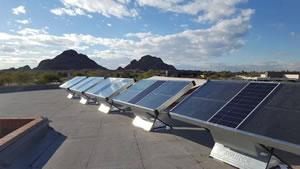This solar panel produces up to 5 liters of drinking water per day from the air
 Derek Markham for TreeHugger: With the virtual explosion of rooftop solar arrays producing clean electricity, the future of democratized power is bright, but when it comes to water, we don't have nearly as many options. Most of us are directly tied into the local water supply, which is great when it works well, and horrible when it doesn't (as evidenced by the recent and ongoing travesties in communities such as Flint, Michigan), and although some homes may capture rainwater for irrigation, or have their own well, there aren't a lot of alternative choices for getting clean drinking water, other than purchasing bottled water.
Derek Markham for TreeHugger: With the virtual explosion of rooftop solar arrays producing clean electricity, the future of democratized power is bright, but when it comes to water, we don't have nearly as many options. Most of us are directly tied into the local water supply, which is great when it works well, and horrible when it doesn't (as evidenced by the recent and ongoing travesties in communities such as Flint, Michigan), and although some homes may capture rainwater for irrigation, or have their own well, there aren't a lot of alternative choices for getting clean drinking water, other than purchasing bottled water.
However, there are some up-and-coming water innovations that could be put into play at homes and businesses that would allow people to have more control over their own drinking water supply. In recent years, the idea of pulling water vapor from the air and condensing it into drinking water is getting a whole lot more attention, and not just in off-grid areas and in the developing world, but also right here in suburbia and urban areas as well. One company that offers a localized clean water solution is Zero Mass Water, and its Source device looks to be a promising addition to homes or businesses that want to gain some water sovereignty.
Zero Mass Water, an Arizona State University spin-off startup based in Scottsdale, has developed a "drinking water solar panel" that is a standalone system requiring no wired or water input connections, and the company has been installing its SOURCE device in pilot programs on homes and in communities since 2015. Full Article:
Comments (0)
This post does not have any comments. Be the first to leave a comment below.
Featured Product

